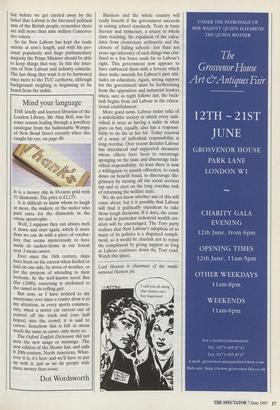Mind your language
THE kindly and learned librarian of the London Library, Mr Alan Bell, was for some reason leafing through a jewellery catalogue from the fashionable Wempe of New Bond Street recently when this caught his eye, on page 40: It is a money clip in 18-carat gold with 52 diamonds. The price is £2,175.
It is difficult to know whom to laugh at more, the makers, or the sucker who paid extra for the diamonds in the otiose apostrophe.
Well, I suppose they can always melt It down and start again, which is more than we can do with a piece of vocabu- lary that seems mysteriously to have made its cuckoo-home in our lexical nest. I mean careen.
Ever since the 16th century, ships have been on the careen when heeled or laid on one side, by stress of weather, or for the purpose of attending to their bottoms. In the well-known novel Ben Ifur (1880), careening is attributed to the camel in its rolling gait.
But now, as I have noticed to my annoyance ever since a reader drew it to my attention, in every sports commen- tary, when a motor car careers out of control off the track and (one half hopes) into the crowd, it is said to careen. Somehow this is felt to mean much the same as career, only more so.
The Oxford English Dictionary did not note the new usage or misusage. The new edition of the Shorter has, and calls it 20th-century, North American. What- ever it is, it's here and we'll have to put up with it, just as we do people with more money than sense.
Dot Wordsworth










































































 Previous page
Previous page